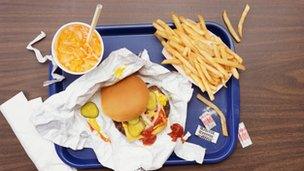Parents back pre-watershed junk food advertising ban
- Published

The Children's Food Trust says parents need more help to discourage unhealthy eating habits
Many parents would like to see a ban on the advertising of unhealthy foods and sugary snacks before the 2100 watershed, a survey suggests.
The poll of more than 1,000 parents found more than half thought adverts for junk food made it harder for them to give their children healthy diets.
The survey, commissioned by the Children's Food Trust, found many parents felt pestered to buy poor food.
The majority (69%) admitted they could do more to promote a healthy diet.
Two-thirds (65%) of the 1,015 parents surveyed said there should be a ban on television advertising of products which were high in fat, sugar or salt before 2100.
This should be regardless of whether the programming was aimed at children or adults, they said.
The poll suggests 40% of parents think children's ability to pester them for junk food makes it harder for them to buy healthy foods.
Almost half (45%) admitted that they let their children influence them when buying food for the family.
The poll was published as the Children's Food Trust and the School Food Trust host their first Children's Food Conference in London.
Wednesday's conference will look at how ensuring a better diet for young people can improve public health.
'Tough job'
Children's Food Trust chairman Rob Rees said: "Parents have such a tough job to encourage their children to eat healthily - and what's clear is that they think there are lots of ways we could make their lives easier.
"This isn't about a 'nanny state' - it's about what will help rather than hinder parents in feeding their children well.
"If we're serious about reducing the crippling costs to the NHS of poor diet, we need to get behind parents on this."
The survey was carried out for the Children's Food Trust by pollsters Comres, who questioned 1,015 parents with at least one child aged three to 15 in February.
- Published16 January 2012